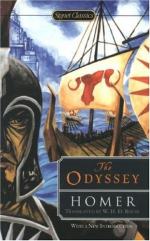“While employed on the wild legend of Odysseus, he met with a ballad, recording the quarrel of Achilles and Agamemnon. His noble mind seized the hint that there presented itself, and the Achilleis grew under his hand. Unity of design, however, caused him to publish the poem under the same pseudonyme as his former work; and the disjointed lays of the ancient bards were joined together, like those relating to the Cid, into a chronicle history, named the Iliad. Melesigenes knew that the poem was destined to be a lasting one, and so it has proved; but, first, the poems were destined to undergo many vicissitudes and corruptions, by the people who took to singing them in the streets, assemblies, and agoras. However, Solon first, and then Peisistratus, and afterwards Aristoteles and others, revised the poems, and restored the works of Melesigenes Homeros to their original integrity in a great measure.”
Having thus given some general notion of the strange theories which have developed themselves respecting this most interesting subject, I must still express my conviction as to the unity of the authorship of the Homeric poems. To deny that many corruptions and interpolations disfigure them, and that the intrusive hand of the poetasters may here and there have inflicted a wound more serious than the negligence of the copyist, would be an absurd and captious assumption; but it is to a higher criticism that we must appeal, if we would either understand or enjoy these poems. In maintaining the authenticity and personality of their one author, be he Homer or Melesigenes, quocunque nomine vocari eum jus fasque sit, I feel conscious that, while the whole weight of historical evidence is against the hypothesis which would assign these great works to a plurality of authors, the most powerful internal evidence, and that which springs from the deepest and most immediate impulse of the soul, also speaks eloquently to the contrary.
The minutiae of verbal criticism I am far from seeking to despise. Indeed, considering the character of some of my own books, such an attempt would be gross inconsistency. But, while I appreciate its importance in a philological view, I am inclined to set little store on its aesthetic value, especially in poetry. Three parts of the emendations made upon poets are mere alterations, some of which, had they been suggested to the author by his Maecenas or Africanus, he would probably have adopted. Moreover, those who are most exact in laying down rules of verbal criticism and interpretation, are often least competent to carry out their own precepts. Grammarians are not poets by profession, but may be so per accidens. I do not at this moment remember two emendations on Homer, calculated to substantially improve the poetry of a passage, although a mass of remarks, from Herodotus down to Loewe, have given us the history of a thousand minute points, without which our Greek knowledge would be gloomy and jejune.




